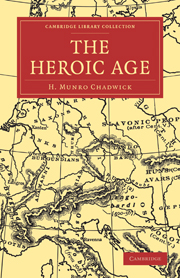Book contents
- Frontmatter
- PREFACE
- Contents
- DEDICATION
- CHAPTER I THE EARLY NARRATIVE POETRY OF THE TEUTONIC PEOPLES
- CHAPTER II THE HEROIC AGE OF THE TEUTONIC PEOPLES
- CHAPTER III SCENE AND NATIONALITY IN THE HEROIC STORIES
- CHAPTER IV THE ORIGIN AND HISTORY OF THE HEROIC POEMS
- CHAPTER V THE POETRY AND MINSTRELSY OF EARLY TIMES
- CHAPTER VI SUPERNATURAL ELEMENTS IN THE HEROIC STORIES
- CHAPTER VII MYTHICAL ELEMENTS IN THE HEROIC POEMS
- CHAPTER VIII THE USE OF FICTION IN THE HEROIC POEMS
- CHAPTER IX THE HEROIC AGE OF GREECE
- CHAPTER X THE HOMERIC POEMS
- CHAPTER XI EARLY GREEK POETRY AND MINSTRELSY
- CHAPTER XII SUPERNATURAL ELEMENTS IN THE HOMERIC POEMS
- CHAPTER XIII MYTH IN THE HOMERIC POEMS
- CHAPTER XIV FICTION IN THE HOMERIC POEMS
- CHAPTER XV THE COMMON CHARACTERISTICS OF TEUTONIC AND GREEK HEROIC POETRY
- CHAPTER XVI SOCIETY IN THE HEROIC AGE
- CHAPTER XVII GOVERNMENT IN THE HEROIC AGE
- CHAPTER XVIII RELIGION IN THE HEROIC AGE
- CHAPTER XIX THE CAUSES AND ANTECEDENT CONDITIONS OF THE HEROIC AGE
- ADDENDA ET CORRIGENDA
- INDEX
- Plate section
CHAPTER IV - THE ORIGIN AND HISTORY OF THE HEROIC POEMS
Published online by Cambridge University Press: 07 September 2011
- Frontmatter
- PREFACE
- Contents
- DEDICATION
- CHAPTER I THE EARLY NARRATIVE POETRY OF THE TEUTONIC PEOPLES
- CHAPTER II THE HEROIC AGE OF THE TEUTONIC PEOPLES
- CHAPTER III SCENE AND NATIONALITY IN THE HEROIC STORIES
- CHAPTER IV THE ORIGIN AND HISTORY OF THE HEROIC POEMS
- CHAPTER V THE POETRY AND MINSTRELSY OF EARLY TIMES
- CHAPTER VI SUPERNATURAL ELEMENTS IN THE HEROIC STORIES
- CHAPTER VII MYTHICAL ELEMENTS IN THE HEROIC POEMS
- CHAPTER VIII THE USE OF FICTION IN THE HEROIC POEMS
- CHAPTER IX THE HEROIC AGE OF GREECE
- CHAPTER X THE HOMERIC POEMS
- CHAPTER XI EARLY GREEK POETRY AND MINSTRELSY
- CHAPTER XII SUPERNATURAL ELEMENTS IN THE HOMERIC POEMS
- CHAPTER XIII MYTH IN THE HOMERIC POEMS
- CHAPTER XIV FICTION IN THE HOMERIC POEMS
- CHAPTER XV THE COMMON CHARACTERISTICS OF TEUTONIC AND GREEK HEROIC POETRY
- CHAPTER XVI SOCIETY IN THE HEROIC AGE
- CHAPTER XVII GOVERNMENT IN THE HEROIC AGE
- CHAPTER XVIII RELIGION IN THE HEROIC AGE
- CHAPTER XIX THE CAUSES AND ANTECEDENT CONDITIONS OF THE HEROIC AGE
- ADDENDA ET CORRIGENDA
- INDEX
- Plate section
Summary
In an earlier chapter (p. 3) it was mentioned that the English heroic poems are usually ascribed to the seventh or eighth centuries. We must now try to see whether any means are to be found of dating their composition more precisely.
Unfortunately very few references to the poems or their subjects occur in works which can be dated with anything like certainty. The most important is contained in a letter from Alcuin to Hygebald, bishop of Lindisfarne, written in the year 797: “When priests dine together let the words of God be read. It is fitting on such occasions to listen to a reader, not to a harpist, to the discourses of the fathers, not to the poems of the heathen. What has Ingeld to do with Christ? Strait is the house; it will not be able to hold them both. The king of heaven will have no part with so-called kings who are heathen and damned; for the one king reigns eternally in heaven, the other, the heathen, is damned and groans in hell. In your houses the voices of those who read should be heard, not a rabble of those who make merry in the streets.” From this passage it is clear that at the end of the eighth century there were current in Northumbria certain poems, probably well known poems, dealing with a heathen king named Ingeld, whom we need not hesitate to identify with Ingeld the son of Froda, who figures in Beowulf.
- Type
- Chapter
- Information
- The Heroic Age , pp. 41 - 76Publisher: Cambridge University PressPrint publication year: 2010First published in: 1912



